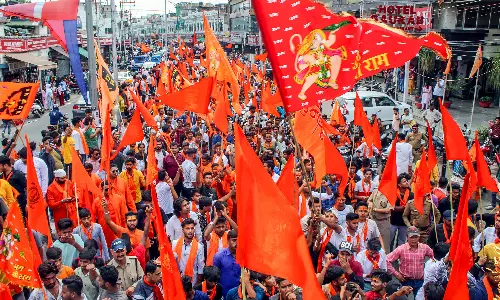AA Edit | BJP alliance plan fails to work in Punjab, Odisha
BJP's ambition of 400+ Lok Sabha seats faces hurdles as key allies like SAD and BJD resist alliance over core issues.;

The BJP has claimed that its National Democratic Alliance will win more than 400 seats in the Lok Sabha elections and that it has been assiduously working towards expanding the base of the coalition as every vote and every seat count in this mission. However, its failure to revive the alliance with Shiromani Akali Dal in Punjab and the Biju Janata Dal in Odisha has gone against this aim.
The Akali Dal is one of the oldest allies of the BJP; next to only the Shiv Sena. In fact, the SAD with a strong anti-Congress grain in its DNA was part of the Janata Party government in 1977 where Atal Bihari Vajpayee and Lal Krishna Advani were ministers. The SAD, led by Prakash Singh Badal, offered unconditional support to the newly-formed NDA in 1996, which helped the BJP shake off, albeit partially, the image it had acquired after the demolition of the Babri Masjid.
The bonhomie continued till 2020 when the two parted ways on the issue of the now-scrapped agricultural laws. While the BJP wanted to extend its economic agenda to the agriculture sector, the SAD suddenly became aware of its core constituency which was to be impacted by the BJP-led government’s plan. The party realised that clinging to power at the Centre would come at the cost of sacrificing the interests of the farmers of Punjab who were on the streets protesting against the Union government and would not hesitate to become its nemesis. Hence the party chose to end its 24-year-old alliance with the BJP. The same realisation has now stopped the party from returning to the fold, also given the BJP’s pattern of slowly subjugating its alliance partners in other states. The JD(U) in Bihar, the Shiv Sena in Maharashtra and the AIADMK in Tamil Nadu are some of the prime examples in this context. With the Congress and its INDIA alliance partner, AAP, going their separate ways, Punjab will now see a four-cornered contest this time.
A similar fear has stopped the BJD from forging a formal alliance with the BJP in Odisha. It is a fact that the BJD has always come to the aid of the saffron party whenever needed in Parliament but it has now chosen to keep its bargaining chip intact. The BJD will sooner or later face a crisis of succession and it will be suicidal to have an ally which has a history of dominating relationships. It knows very well that even a small concession it now makes to the BJP, whether in terms of the number of seats to the Assembly or to the Lok Sabha, will come back to haunt it. In addition, a BJD-BJP alliance will concede the Opposition space fully to the Congress, which neither party wants.
The BJP has perfected the art of creating and maintaining alliances in the last three decades but it appears that the party sometimes slips on its promises to parties with strong bases. No tall talk, but learning such skills will come in handy on a rainy day.


